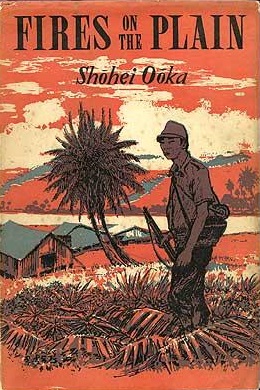
Summary
Fires on the Plain (Japanese: 野火 Nobi) is a Yomiuri Prize-winning novel by Ooka Shohei, published in 1951. It describes the experiences of a soldier of the routed Imperial Japanese Army in the Philippines, as part of the Battle of Leyte and the Battle of Ormoc Bay, at the end of 1944, towards the final months of World War II.
 | |
| Author | Ōoka Shōhei |
|---|---|
| Original title | Nobi |
| Translator | Ivan Morris |
| Country | Japan |
| Language | Japanese, English (translated) |
| Genre | War novel |
| Publisher | Secker & Warburg (UK) Alfred A. Knopf (US) |
Publication date | 1951 |
Published in English | 1957 |
| Media type | |
| Pages | 246 |
| Awards | Yomiuri Prize |
| ISBN | 0-8048-1379-5 |
| 895.63 | |
| LC Class | PZ4.O575 Fi2 |
Summary edit
The story is told through the eyes of a Private Tamura who, after being thrown out by his own company due to illness, chooses to desert the military altogether and wanders aimlessly through the Philippine jungle during the Allied campaign. Descending into delirium, Tamura is forced to confront nature, his childhood faith, hunger, his own mortality, and in the end, cannibalism.
Literary significance and criticism edit
The book received the Yomiuri Prize and, along with Tsukamaru made, is perhaps the best-known of Ooka's work among English readers. An English language translation by Ivan Morris was completed in 1957. It was made into a film of the same name in 1959, directed by Kon Ichikawa and starring Eiji Funakoshi. David C. Stahl has noted that Morris expunged sections where the narrator makes clear that he is manipulating the memoir, while Ichikawa focused on the helplessness of the individual in the face of war. In both versions, the Tamura character is more passive and weak than in the original work.[1]
Morris, writing in his introduction in the 1957 English version that he translated, praised the book as one of the most "powerful accounts of the obscenity of war that has ever been written". In his view, the only other comparable novels of the Second World War, published up to that time (1957), were Stalingrad by Theodor Plievier (1948) and Look Down in Mercy by Walter Baxter (1951).[2]


